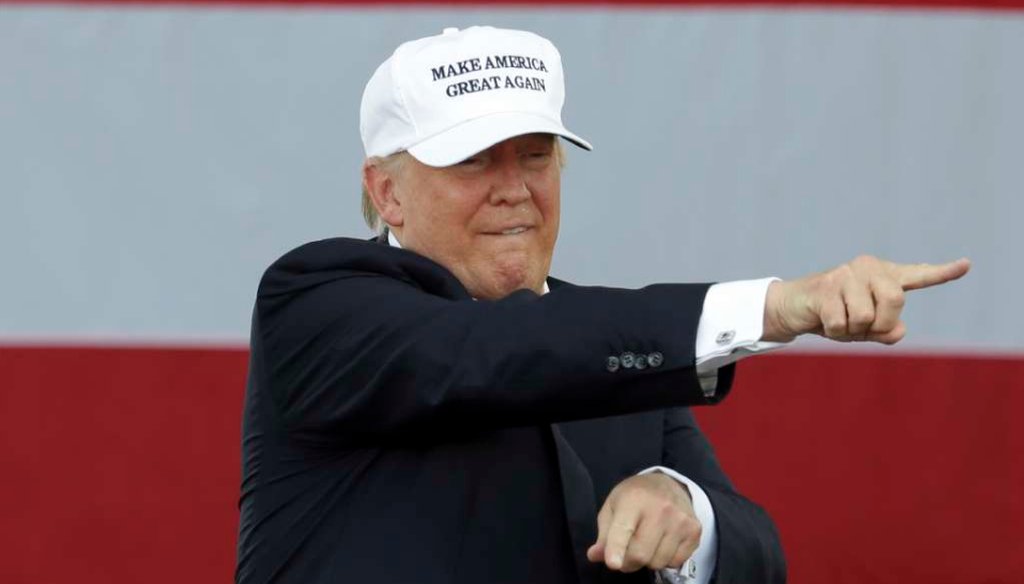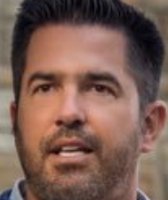Stand up for the facts!
Our only agenda is to publish the truth so you can be an informed participant in democracy.
We need your help.
I would like to contribute

Republican presidential candidate DonaldTrump speaks during a campaign rally at Bayfront Park Amphitheater, Wednesday, Nov. 2, 2016, in Miami. (AP Photo/Lynne Sladky)
Donald Trump’s wealth and Hillary Clinton’s record as Secretary of State were some of the contentious topics in 2016 that fueled our most clicked-on fact-checks at PolitiFact Florida.
Also fueling our Truth-O-Meter were statements by two of Florida’s Republican presidential primary opponents -- former Gov. Jeb Bush and U.S. Sen. Marco Rubio -- as well as former Democratic National Committee chair U.S. Rep. Debbie Wasserman Schultz.
But it was a story about race and murder statistics that we wrote in 2015 hat drew the most clicks in 2016. Our story explained that FBI data shows that whites usually kill whites, and blacks usually kill blacks. In recent years, these statistics have repeatedly drawn interest in the aftermath of high-profile shooting deaths in which race was a factor.
Here’s a look at the most-clicked on fact-checks and articles we published in 2016:
10. Massive alligator spotted roaming Florida golf course. Is it real?
In May, a video went viral of a giant alligator strolling across a Florida golf course. We went to the Manatee County golf course to find out if it was real. After speaking with the course’s regional manager and a University of Florida gator expert (and seeing additional video of the gator), we can say this video holds up. We rated this claim True.
9. A guide to the attacks on Patrick Murphy’s resume
Republicans attacked Murphy for stretching the truth about his resume. We found that Murphy’s descriptions of his past employment at an accounting firm and small business were based on actual circumstances, but at times he omitted a full explanation. Murphy, a Democrat who represented the Treasure Coast in Congress, lost the U.S. Senate race to Rubio. Here is our story.
8. Donald Trump says of course Mexico can pay for wall -- because of the trade deficit
Forcing Mexico to build the wall was one of Trump’s key campaign promises. Estimates to build a wall vary widely, though the ones we saw were smaller than the $50 billion trade deficit. Trump’s overall message here was misleading, though, because he suggested that the size of the trade deficit is proof that Mexico could pay for the wall. In reality, the trade deficit has nothing to do with whether the Mexican government could afford to write the United States a check. We rated this statement False.
7. Democratic debates set to 'maximize' exposure, Wasserman Schultz claims
Wasserman Schultz faced criticism for the Democratic Party’s primary debate schedule. While Democrats largely scheduled their debates with TV networks, which means viewers without cable could see them, her statement was very disingenuous. There were six Democratic party debates compared with 11 scheduled for the Republicans, and half of the Democratic debates were on weekends -- including one the weekend before Christmas and another on the Martin Luther King Jr. holiday weekend. If the Democrats had wanted to "maximize" opportunities for viewers, the party could have added more debates, scheduled them on weekdays and avoided holidays. We rated this claim False.
6. Debbie Wasserman Schultz says superdelegates never determined Democratic nominee
The first election where Democrats used superdelegates was in 1984, where they helped Walter Mondale secure the nomination on the first ballot at the convention. It’s not clear that they were the "determining" factor. Some say Mondale would have won without them. Since that time, a Democrat has won the nomination early enough where the superdelegates haven’t mattered. We rated this claim Mostly True.
The death of U.S. Supreme Court Justice Antonin Scalia prompted some of the Republican presidential candidates, including Rubio, to call on President Barack Obama to hold back on his replacement and leave the decision to the next president. The most recent contradiction of this claim would be Reagan’s nomination of Kennedy who was nominated in November 1987 and confirmed during Reagan’s final year of office in February 1988. We rated this claim Mostly False.
4. Donald Trump wrongly blames Hillary Clinton for the creation of ISIS
This became a talking point for Trump, who also pointed blame at times at Obama. There were several factors that contributed to the growing power of ISIS, but it’s misleading to pin the responsibility solely on Clinton. For starters, the roots of ISIS trace back to 2004, when George W. Bush was president and before Clinton was Obama’s secretary of state. She did vote to authorize force in Iraq in 2002 while a senator, but that was advocated by the Bush administration and the vast majority of senators. The intervention in Libya, which she supported, did give ISIS an opening, but Trump is overstating her role by saying she is responsible for ISIS. We rated this statement False.
3. Was college once free in the United States as Bernie Sanders says?
There was a time in the United States when some public colleges and universities charged no tuition. However, tuition has never been set as a national policy -- it is a decision for each school or state government officials. Sanders also said that free college exists in countries all over the world today. There are at least nine advanced countries that offer free college, including Germany. We rated this statement Mostly True.
2. The electoral college vs. the popular vote: Could states do an end-run around the current system?
After Clinton won the popular vote but Trump won the Electoral College, activists renewed a push to revamp the system by which the presidency is awarded. Ten states and the District of Columbia have signed on to the National Popular Vote Interstate Compact, in which states agree to award all their electoral votes to the winner of the national popular vote. The compact only takes effect when states totalling 270 electoral votes sign on, and so far the effort still falls short of that. If enough states ever sign on, the plan would likely face a court challenge. Here is our story.
1. Did Donald Trump inherit $100 million? During a testy exchange at the Republican debate in Detroit on March 3, 2016, Rubio said of Trump "He inherited over $100 million." Trump interjected: "Wrong. Wrong. Wrong." We did not put this claim on the Truth-O-Meter because it was difficult to verify how much Trump inherited, but Rubio had a point that Trump was not a self-made man. It’s a bit of a mystery how much Trump inherited from his father, Fred Sr. When he died in 1999; the New York Times reported that "his estate has been estimated by the family at $250 million to $300 million" but it was unclear exactly how it was divvied up. Here is our story.
Spot a claim we should fact-check in 2017? Tweet us #PolitiFactThis or email [email protected]
Our Sources
See individual fact-checks for sources


































